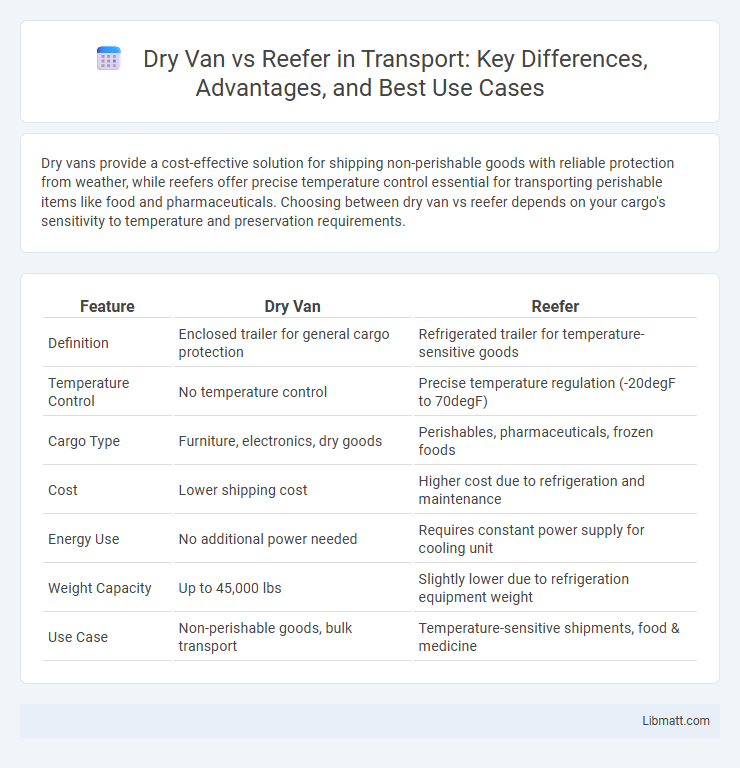Dry vans provide a cost-effective solution for shipping non-perishable goods with reliable protection from weather, while reefers offer precise temperature control essential for transporting perishable items like food and pharmaceuticals. Choosing between dry van vs reefer depends on your cargo's sensitivity to temperature and preservation requirements.
Table of Comparison
| Feature | Dry Van | Reefer |
|---|---|---|
| Definition | Enclosed trailer for general cargo protection | Refrigerated trailer for temperature-sensitive goods |
| Temperature Control | No temperature control | Precise temperature regulation (-20degF to 70degF) |
| Cargo Type | Furniture, electronics, dry goods | Perishables, pharmaceuticals, frozen foods |
| Cost | Lower shipping cost | Higher cost due to refrigeration and maintenance |
| Energy Use | No additional power needed | Requires constant power supply for cooling unit |
| Weight Capacity | Up to 45,000 lbs | Slightly lower due to refrigeration equipment weight |
| Use Case | Non-perishable goods, bulk transport | Temperature-sensitive shipments, food & medicine |
Introduction to Dry Van and Reefer Trailers
Dry van trailers are standard enclosed units primarily designed for transporting non-perishable goods, offering protection from weather and theft while maintaining a stable, non-temperature-controlled environment. Reefer trailers, or refrigerated trailers, feature integrated refrigeration systems essential for shipping temperature-sensitive products like perishable foods, pharmaceuticals, and chemicals, ensuring precise temperature control throughout transit. Understanding the distinction between dry van and reefer trailers is crucial for optimizing cargo safety, preserving product quality, and meeting regulatory requirements in logistics and supply chain management.
Key Differences Between Dry Van and Reefer
Dry vans provide a versatile, temperature-neutral environment ideal for transporting non-perishable goods, while reefers are equipped with refrigeration units that maintain specific temperatures essential for perishable items like food and pharmaceuticals. Dry vans typically offer lower operational costs due to simpler design and no need for power sources, contrasting with reefers that require continuous temperature control and monitoring, leading to higher fuel and maintenance expenses. The choice between dry van and reefer depends heavily on the cargo's sensitivity to temperature and the required level of environmental control during transit.
How Dry Van Trailers Work
Dry van trailers are enclosed rectangular containers designed to transport a wide range of non-perishable goods by protecting them from weather and road debris. They rely on a sealed, ventilated environment, without temperature control, making them ideal for products like electronics, furniture, and clothing. Your choice of a dry van trailer ensures cost-effective shipping for durable freight that does not require refrigeration.
How Reefer Trailers Operate
Reefer trailers operate by using a built-in refrigeration unit that maintains a controlled temperature environment, essential for transporting perishable goods like food and pharmaceuticals. These trailers utilize electric or diesel-powered compressors to regulate temperature, humidity, and airflow, ensuring cargo remains fresh throughout transit. Unlike dry vans, reefer trailers require a constant power source to operate their cooling systems, making them ideal for temperature-sensitive shipments.
Types of Freight Suitable for Dry Vans
Dry vans are ideal for transporting non-perishable goods such as electronics, clothing, furniture, and packaged foods that do not require temperature control. These trailers provide a secure, weather-resistant environment suitable for dry, palletized freight. Industries like retail, manufacturing, and consumer goods rely heavily on dry vans for efficient long-haul distribution.
Goods Transported by Reefer Trailers
Reefer trailers are specifically designed to transport perishable goods that require strict temperature control, such as fresh produce, dairy products, pharmaceuticals, and frozen foods. Unlike dry vans, which handle non-perishable items like clothing or electronics, reefers maintain refrigerated or frozen conditions to preserve product quality throughout transit. Your choice of a reefer trailer ensures the safe delivery of temperature-sensitive cargo, preventing spoilage and maintaining compliance with regulatory standards.
Cost Comparison: Dry Van vs Reefer
Dry vans generally have lower operational and maintenance costs compared to reefers, as they do not require refrigeration units or additional fuel to maintain temperature control. Reefer trailers incur higher expenses due to power usage, filter replacements, and potential repairs related to cooling systems, which can significantly impact your overall transportation budget. Choosing between dry van and reefer depends largely on your cargo's temperature sensitivity and your cost management priorities.
Pros and Cons of Dry Van Trailers
Dry van trailers offer versatile, cost-effective transportation for non-perishable goods, providing excellent protection from weather and theft. Limited temperature control restricts their use for temperature-sensitive or perishable cargo, potentially leading to spoilage or damage. These trailers feature lower operational costs and higher cargo capacity compared to refrigerated alternatives, making them ideal for general freight.
Advantages and Disadvantages of Reefer Trailers
Reefer trailers provide precise temperature control for perishable goods, ensuring freshness and compliance with health standards, which is a significant advantage over dry vans. However, reefer trailers incur higher fuel costs and require more maintenance due to their refrigeration units, making them less cost-effective for non-perishable cargo. Despite these drawbacks, their ability to transport temperature-sensitive products makes them essential in industries like food, pharmaceuticals, and chemicals.
Choosing the Right Trailer for Your Shipping Needs
Selecting between a dry van and a reefer trailer hinges on the type of cargo and temperature requirements; dry vans are ideal for non-perishable goods, offering secure, weather-resistant transport. Reefer trailers provide controlled temperature environments crucial for perishable foods, pharmaceuticals, and temperature-sensitive products. Evaluating shipment duration, climate conditions, and product sensitivity ensures the best trailer choice to maintain cargo integrity and optimize shipping efficiency.
dry van vs reefer Infographic

 libmatt.com
libmatt.com